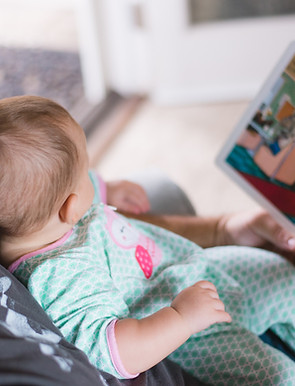About Me. #meetthescientist
My name is Melanie Texeira and I am a first generation Uruguayan-American. I speak three languages; spanish, english, and portuguese. I am pursuing a bachelor's degree in Biomedical Science and Enterprise with the dream of become a Pediatrician; specifically for underfunded/underprivileged communities. For as long as I can remember, I have always enjoyed helping others, a passion that stems from my background. I grew up translating for my parents, my classmates, coworkers, and beyond. I hope to use my passion for helping in the pediatric field. I also have a passion for educating, specifically parents, on developmental milestones in toddlers, and I hope to continue to educate and aid the community around me with my current research project.
Education
2021-2024
B.I.S in Biomedical Science and Enterprise
Georgia State University
I will graduate in May with my Bachelors degree after three years of undergrad. I am apart of many organizations including Chemistry Club, MSMD, and Greek life.
2018-2021
Dual enrollment credit certificate
Gwinnett Technical College
I completed three and a half years of dual enrollment courses throughout my high school career and graduated from the dual enrollent program a few months before graduating high school.
2017-2021
High School Diploma
Lakeside High School
I graduated high school with a 4.2 GPA and I was the Vice President of my graduating class. I was also apart of many clubs including Key Club, National Honors Society, and Student Government.

Current Projects
Keep up with my latest projects!
01
Pediatric Internship/Research
02
Coming soon
I am currently working alongside MD Dr. Montana studying developmental milestones in toddlers aged 2-5yo. Our research centers around children meeting these milestones, parental education, and the importance of parent-child interaction and stimulation.
03
Coming soon
04
Coming soon
Signature experience


"REACHING MILESTONES AND IMPORTANCE OF PARENT-CHILD INTERACTIONS AND LIMITED SCREEN USAGE."
"Children under 5 years old should have their own phone!"
Though a lot of parents think this way, excessive phone use in children is a real issue within our society today. My research focuses on the relationship between excessive phone use, and lack of parent-child stimulation, and the effects these actions may cause in terms of harboring developmental delays, specifically in toddlers. I believe that the rise in excessive screen time usage by children is due to a gap of knowledge in regards to their parents. My research plans to bridge that gap by providing accurate information to parents not only about the risk factors that can lead to developmental delays but also properly informing parents on what developmental delays are and the serious and typically long term effects that these delays have on children.To do this, I have created questionnaires for parents who came into the clinic with children between the ages of 2-5, to fill out. The purpose of the questionnaires is to get a basic level of understanding of the child’s development from the parents perspective. Once I receive the questionnaire I am able to ask follow up questions or asses the child’s development myself with the help of Dr. Suzana. The questionnaires I created focus on the development of their child and ask questions including: “How many hours a day do you spend playing with your child?, How many hours a day do you read to your child?, How many hours does your child spend on a screen?” in order to asses the parent-child interaction area of concern. The questionnaire also asks questions including: “Does your child understand commands?, Interact well with others?, Is your child able to communicate with others in one way or another?, and Does your child cry a lot or have behavioral problems?” in order to asses the social and behavioral areas of concern regarding developmental milestones children should be reaching. The questionnaire also asks if parents suspect that their child has any form of autism and if they have any concerns about their child’s development in general. Finally, since the clinic in which I did my research is very diverse, the questionnaire includes a question on ethnicity, in order to asses if there are secondary correlations to toddler developmental delays. After receiving the data I would compare children who are reaching their developmental milestones to children who are not and noting which questions were answered differently. In conclusion I noticed that children who spent more hours a day on a screen were also experiencing some level of developmental delay, some more severe then others. I also concluded that most parents who’s children had some level of developmental delays, had no idea of the effects of excessive screen time usage, regardless if their children are watching seemingly educational videos. Though there is more research to be done in this topic specifically, I feel as though my research has allowed me to have a good foundation in order to, in the near future, advance the field.
Reflection: This signature experience course has prepared me for my future in many ways. I have learned many skills including project organization and management, professional communication, and adapting to audience appropriate approaches. These are all necessary skills in the field of pediatrics in which I know I’ll be applying daily. Through this course I have learned what it takes to design a project from start to finish and what it takes to see the results. I have learned how to manage my research in between my other course and organize all the data into an easy to read format. Professional communication will be something that I will use daily in the workforce when speaking to colleagues and peers, as well as when speaking to patients. I have learned this skill through my experience during my time interning for Dr. Suzana. My project has also allowed me to adapt to audience specific approaches and the best example for this is the questionnaires I designed. They are easy to read and most parents are able to fill them out in around 1-1.5 mins. This is a skill I will carry with me because it is very important to be able to communicate with parents effectively without making them feel as though I am wasting their time.
Links:
Arundel, K. (2023, July 25). CDC finds ‘significant’ increase in developmental disabilities among children. K-12 Dive. https://www.k12dive.com/news/cdc-significant-increase-developmental-disabilities/688483/#:~:text=The%20prevalence%20of%20developmental%20disabilities,for%20Disease%20Control%20and%20PreventionCauses and Risk Factors. (2022, April 8). Centers for Disease Control and Prevention. https://www.cdc.gov/ncbddd/developmentaldisabilities/causes-and-risk-factors.htmlFacts about Developmental Disabilities | NCBDDD | CDC. (2022, April 27). Centers for Disease Control and Prevention. https://www.cdc.gov/ncbddd/developmentaldisabilities/facts.htmlProfessional, C. C. M. (n.d.). Developmental Delay in Children. Cleveland Clinic. https://my.clevelandclinic.org/health/diseases/14814-developmental-delay-in-children



